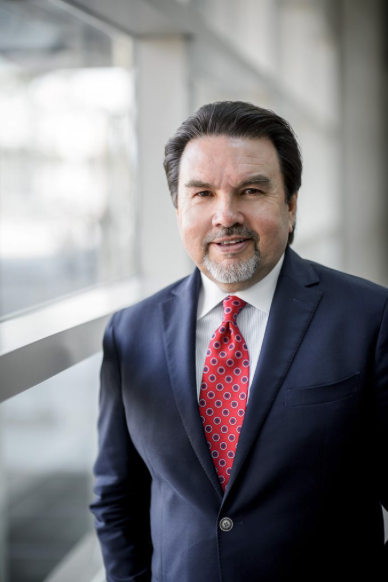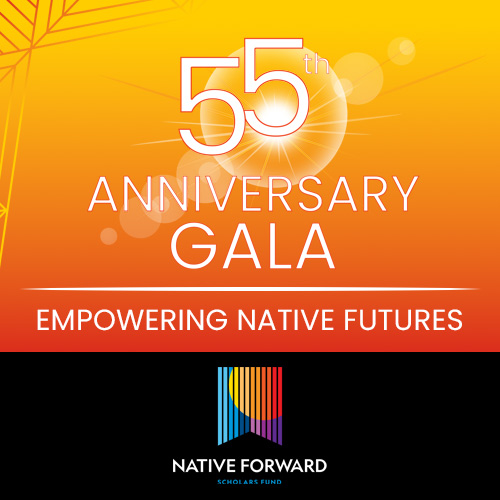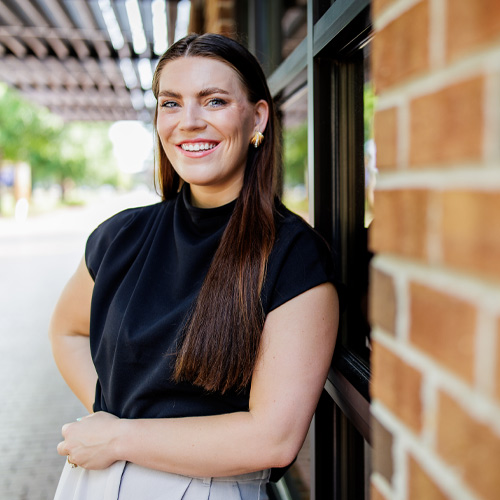By Sara LaBarge, Native Forward Alumna
“Native Forward is committed to empowering Native scholars across the United States in their pursuit of higher education.” – Walter Lamar
When it comes to pursuing self-determination, Native Forward provides access to one of the most important tools Native scholars can leverage: education.
The organization started as a grassroots effort to address disparities that Native communities were facing — disproportionate access to healthcare, education, home ownership and employment, to name a few — by empowering Native students to pursue law degrees to protect Tribal nations and people. Over time, it transformed from a movement toward self-governance to The Center for Native Scholarships.
Walter Lamar (Blackfeet & Wichita), vice president of Native Forward’s Board of Directors, spoke to the significance of the organization’s work, sharing that education is a tool for Native communities to create self-determination.
“As we look at what we do at American Indian Graduate Center, we’re providing the means for Native scholars to dedicate the time and attain their educational goals. We are creating accessibility and that accessibility promotes inclusion, which puts us on a path to equity,” Lamar said.
Native Forward was founded on the principle that to be fully included in society, Native individuals must be afforded equal opportunities to achieve their goals. Yet, historically, and still today, there are many barriers that prevent Native students from accessing education.
Lamar reflected on a not-so-distant time in his own memory when the Bureau of Indian Affairs was managed by non-Native individuals who were making decisions that impacted Native communities, from social services to land management.
“When you look at the Bureau of Indian Affairs, it really was a ‘late in the game’ tool to continue this methodology of domination. When you think back on the early days of the BIA, it was all non-Natives that we’re working there and had complete control over social services, welfare dollars and all of these significant family dynamics,” Lamar said. “This is etched in our recent memory — it’s not something from some bygone era.”
Lamar’s recollections indicate one of the very reasons that Native Forward’s work is so critical — the organization empowers Native scholars to pursue their academic aspirations, producing leaders and professionals across a variety of sectors that in turn create self-determination.
A perfect example: Native Forward Alumna Deb Haaland (Pueblo of Laguna).
Haaland made history as the first Native individual to be nominated for the position of Secretary of the Interior. The Department of the Interior oversees about 500 million acres of public land and federal policies affecting the 574 federally recognized Tribal governments, including three offices for Tribal affairs: the Bureau of Indian Affairs, the Bureau of Indian Education and the Bureau for Trust Funds Administration.
The Department of the Interior is tasked with a host of responsibilities, including honoring the United States’ commitments to American Indians and Alaska Native communities. Yet the very department charged with upholding these commitments has never been led by a Native person.
With Haaland at the helm, there is the opportunity for the Department of the Interior address significant issues that have negatively impacted Tribal communities for generations: restoring and preserving sacred sites such as Bears Ears National Monument, Chaco Canyon and the Arctic National Wildlife Refuge and revisiting other land claims, as well as pushing for a more equitable COVID-19 response for Native communities.
“The more Native scholars we have educated in a whole variety of disciplines gives us the opportunity to move into and transform these spaces where we aren’t represented and create a more inclusive society,” Lamar said. “Essentially what we are striving for is Indigenous self-determination.”
In the organization’s work toward self-determination, Lamar said Native Forward also needs support from allies.
“To promote self-determination, we need to have allies,” Lamar said. “We turn to them to help recreate our history and experience — or at least recognize it — because there has been a tremendous effort to erase our cultures, history and experiences.”
One such ally has been MacKenzie Scott, who gave an unrestricted $20 million donation in July 2020. With Scott’s generous gift, the largest unrestricted donation in Indian Country’s history, Native Forward now can extend its reach and empower more scholars in pursuit of higher education. Support from Scott and all the organization’s generous donors further Native Forward’s mission of empowering Native scholars.
“It’s part of our responsibility as we move forward to invite our Native scholars into this conversation about equity and access to higher education,” Lamar said. “American Indian Graduate Center is committed to empowering Native scholars across the United States in their pursuit of higher education. Equipped with education and understanding, they will lead the way to self-determination.”
Read more articles like From Self-Determination to Indigenization in the Spring 2021 edition of The Native Forward Magazine.






